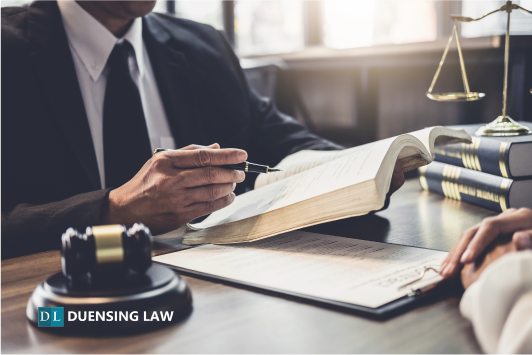A legal will and a power of attorney document complement each other but are different. It is highly advised that an adult creates both legal documents during their lifetime to avoid future constitutional and family troubles.
A last will is a document that allows you to decide who will inherit your assets after you die. As the testator, you select who your heirs will be and what they each will receive. You also name an executor, who will be responsible for distributing your assets in accordance with your wishes. A last will can also be used to name a guardian for your minor child.
A power of attorney (POA) is a legal document that authorizes someone else to make business, legal, and financial decisions on your behalf. If you become unable to manage your own affairs, the person you choose will be able to do it for you. Your representative will be able to pay your bills, make repairs to your home, sell your car, run your business, and more.
Duensing Law is an experienced will planning lawyer in Toronto. We structure your individual requests and instructions to ensure your estate is administered as per your wishes.
In event of a death, our estate administration lawyers in Toronto administer the appropriate distribution of the principal’s Last Will. A devoted probate attorney will assist you in simplifying the otherwise comprehensive legal documentation and will guide you through the differences between formal and informal probates, will limitations, outstanding debt you are responsible for and your legal responsibilities as the trusted executor.
What’s the Difference Between a Living Will and a Power of Attorney?
A living will is a document that sets out your wishes for end-of-life medical care in the event you cannot articulate them yourself.
A Power of Attorney (POA) is a legal document in which you name a specific person to act on your behalf. A POA for personal care gives someone you trust the ability to make healthcare decisions.
A last will provides clear instructions and peace of mind after you have moved on.
Can You Do A Power of Attorney Without a Lawyer?
No, a lawyer is not necessary but it is highly recommended. Having a licensed attorney will erase all miscommunication and give you the best legal guidance. A POA bears sensitive subject matters and it is important that you understand the powers you can give your representative.
Our legal counsel can provide you with an objective and experienced POA advice offering you additional comfort.
What power does a POA have?
A Power of Attorney is a legal document that enables the representative to make decisions on the behalf of the person signing the POA.
There are three types of Power of Attorney in Ontario:
A Continuing Power of Attorney for Property (CPOA) covers your financial affairs and allows the person you name to make decisions for you even if you become mentally incapable.
A non-continuing Power of Attorney for Property covers your financial affairs but can’t be used if you become mentally incapable. You might give this Power of Attorney, for example, if you need someone to look after your financial transactions while you’re away from home for an extended period of time.
A Power of Attorney for Personal Care (POAPC) covers your personal decisions, such as housing and health care.
A CPOA can go in effect on the date you sign it meaning your representative can act for your immediately after you sign, or it can go in effect when you become incapacitated. You can request that your representative must obtain a letter from a licenced physician confirming that you are no longer capable of making your own decision.
Does a Will Supersede a Power of Attorney?
No, but a Power of Attorney can have a great influence on the Last Will before the person passes away. A POA is no longer valid after the person is deceased, leading to the personal representative appointed in their will to take control of their property and appropriately divide their belongings through clear instructions found in the will.
If there is no will, the proper jurisdiction distributes the deceased person’s property according to a legislated set of rules. The importance of a valid will is fundamental to proper distribution of their property and ownership, as their wishes cannot be appropriately processed if they have not been expressed properly in a legal way.
Meet a Reputable Will Planning Lawyer in Toronto
Amidst tragedy and death, emotions can run high. Our legal counsel at Duensing Law has the reputable knowledge, the experienced legal professionals and the imperative attention to will details so that nothing needs revisiting once it is composed.
To work with our reputable legal attorneys and find your peace of mind contact us at info@duensinglaw.com or book an appointment online.



Comments are closed.